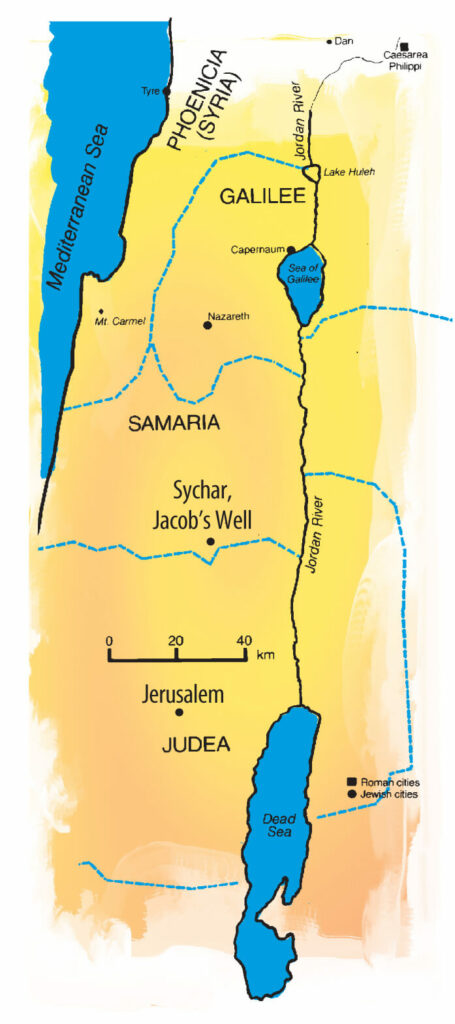
The Samaritan woman has no personal name. The gospel identifies her as a representative of her people. She knows their history and speaks their alienation in her dialog with Jesus.
Jews and Samaritans trace their common ancestry back to the patriarch Jacob, later named Israel, and his wives Rachel, Leah, Bilhah, and Zilpah. Twelve tribes descend from this family. With Moses the tribes make a covenant to be God’s people and keep the ten commandments. Under David the twelve tribes become one kingdom. After David’s son King Solomon, the united kingdom splits in two. Samaria becomes the capital of the northern kingdom; Jerusalem, the capital of the south.
This split deepens after Assyria destroys Samaria, deports many of its people, and resettles the land. These new settlers from Babylon, Cuth, Hamath, Avva, and Sephariam worship their own gods. Because the Samaritans intermarry with them, Samaria becomes the home of heretics, according to the Jews of the south. It is not the woman but Samaria that has had five husbands in its past—the false gods of the new settlers. The story is in 2 Kings 17.
The woman recognizes Jesus is a prophet because he speaks like prophets such as Hosea when he compares people’s relationship with God to a marriage. Jesus is calling the woman and her people out of their past relationships with other gods and offering himself as the real husband of Samaria.
- What difference does it make to recognize Jesus is talking to this woman as a representative Samaritan rather than a sinner?
Jesus’ encounter with the Samaritan woman is more than a conversation. It’s a wooing. The signs Jesus works in John’s gospel begin with the lavish six jars of wine he provides for a wedding feast that has run out of spirits (2.1-12). Jesus is the bridegroom who pours out the Spirit in a new community.
The setting of Sunday’s gospel at a well brings the marriage theme back into the story. The well is a common courting place in ancient times, just as restaurants and other watering holes are today. Jacob, for whom this well is named, met his wife Rachel at a well. A servant looking for a wife for Jacob’s father, Isaac, found Rebecca at a well.
Moses rescued seven sisters at a well and married one of them. At Jacob’s well the bridegroom Jesus woos the Samaritan woman and Samaria into union with him in the community of the new Israel.
John’s gospel contrasts the noontime when Jesus woos the Samaritan woman, a supposed heretic, and the nighttime in the chapter preceeding when Nicodemus, a Jew and strictly observant Pharisee, comes to visit Jesus. Jesus leads both of them on through deliberate double meanings.
Jesus winds up in a monologue with an uncomprehending Nicodemus. The woman, however, questions, objects, and challenges Jesus until in the end she recognizes—aha! he is the messiah. She models bringing one’s life story into dialog with Jesus and struggling to break open the word he speaks.
- What do you appreciate about the woman’s faith journey as a wooing?
Are you greater than our father Jacob, who gave us this well?” the Samaritan woman asks, when Jesus offers her living water. This is a Samaritan question. The well has been an abiding gift to the people of central Israel. But Jesus’ gift goes beyond Jacob’s. In the water Jesus gives, the Spirit wells up within the person into eternal life. Jesus’ gift quenches all thirst.
The wooing moves toward the woman’s recognition of Jesus as bridegroom to both Israel and Samaria. Boundaries begin to give way. The woman acknowledges her people expect a messiah who will tell them the things of God. “I am he,” Jesus says, the first of many times in John’s gospel when Jesus uses the divine name God first confided to Moses—I Am.
No wonder the woman leaves her water jar behind and goes to her townspeople. Jesus calls her out of her alienation into his new community of spirit and truth. The messiah has courted and proposed. She challenges the villagers to see in Jesus what she has seen, “Could this be the messiah?” They come and see Jesus and ask him to stay, which in John’s gospel means to dwell with. On the strength of the woman’s word of testimony, these Samaritans join the community in which Jesus abides.
In John’s gospel only the Samaritan woman brings a whole group to Jesus. Andrew brings Peter. Philip brings Nathanael. She brings a whole town. She is transparent. Her people see through her to Jesus.
- How does your parish bring people—youth, immigrants, the elderly—to Jesus?
- When have you experienced the Spirit well up within you? Where has trusting the Spirit’s stirrings led you?
